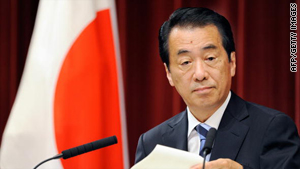 Tokyo, Japan (CNN) -- The wife of Japan's prime minister is a pragmatist. When her husband, Naoto Kan, became prime minister in June, they moved in only with their summer clothes, she told a Japanese weekly magazine.
Tokyo, Japan (CNN) -- The wife of Japan's prime minister is a pragmatist. When her husband, Naoto Kan, became prime minister in June, they moved in only with their summer clothes, she told a Japanese weekly magazine. Her fashion move may have been a premonition.
Japan's first couple may well not see an autumn in the prime minister's residence, as Japan's leading political party votes for its third party leader this year, on Tuesday. The party leader typically becomes the prime minister, because the Democratic Party of Japan, also known as the DPJ, has the majority in Japan's parliament. If Naoto Kan can't keep his three-month job as the party leader, the country will likely have its third prime minister this year.
Running against Kan is Ichiro Ozawa, a political heavyweight widely known for backroom political deals that won him the nickname the "Shadow Shogun." Ozawa says he is challenging Kan because he thinks the prime minister has been ineffective and lacks determination. Ozawa says Kan has been unable to wrest power from the government's powerful bureaucrats.
The two men worked together to bring the DPJ into power more than a year ago, booting out the Liberal Democratic Party, which had ruled Japan continuously for almost 50 years. A political funding scandal forced Ozawa to resign as party leader late last year, and Kan publicly distanced himself from his ally.
The prime minister has, at every recent opportunity, reminded the public of Ozawa's controversial past and repeated that the top job should be one of trust.
"Mr. Ozawa should tell Japan what kind of prime minister he would like to be," Kan said at a recent campaigning event, insinuating that Ozawa is a political wheeler-dealer, not a statesman.
"I have to be myself," Ozawa said in response. "I will implement polices as the prime minister in a sincere manner. We have to put our priorities on improving the lives of the people."
A public investigation into the funding scandal continues against Ozawa, with an indictment still possible. Yet Ozawa, who has been a political operative in Japan for four decades, remains a formidable candidate against Kan.
Within the DPJ, many politicians owe their current jobs to Ozawa's deals. Yukio Hatoyama, the prime minister before Kan, said of Ozawa, "I became prime minister, thanks to Mr. Ichiro Ozawa's gracious guidance. I must repay him." It suggests that political payback may reign supreme to the direction of the country.
The political skirmishes have been fodder for the nightly news in Japan, but the revolving door at the top job in Tokyo has meant a lack of policy for the world's third-largest economy, wracked with deflation, a surging currency and an exploding elderly population.
On the economy, Ozawa favors stimulus spending. He unveiled his proposal for a 2-trillion-yen ($24 billion) stimulus plan, more than twice that of Kan's proposal. Ozawa has also suggested the government may have to issue more bonds, even issuing zero-interest national bonds, to boost the economy in the face of deflation.
On the currency, Ozawa has said the Bank of Japan should intervene and curb the yen's advance by selling the yen. The yen is at a 15-year high versus the U.S. dollar, eroding the value of overseas earnings for exporters like Toyota.
The prime minister has also said Japan should yet again revisit the issue of moving U.S. Marine Corps Air Station Futenma off the island of Okinawa. In May, Japan and the U.S. agreed to move the air station within Okinawa, after months of back-and-forth debate that strained relations between the two allies. The issue torpedoed then-Prime Minister Yukio Hatoyama's approval ratings and ultimately cost him his job. Yet Ozawa has maintained that the issue merits more negotiations with Washington.
Kan has opposed any further dispute over the base. Kan also favors reining in Japan's debt, the developed world's largest. More stimulus spending will eventually lead to a crisis similar to the one experienced in Greece, he says.
National poll after poll shows Kan is the public's preferred choice as the nation's leader. Opinion polls show voters favor Kan 65 percent to 70 percent, versus Ozawa's support, which lingers in the teens.
But the public doesn't vote in the DPJ party leader election. It's up to the politicians.
Labels: Japan's revolving door of prime ministers set to spin again





 Both indices have regained these levels after almost 32 months.
Both indices have regained these levels after almost 32 months.








